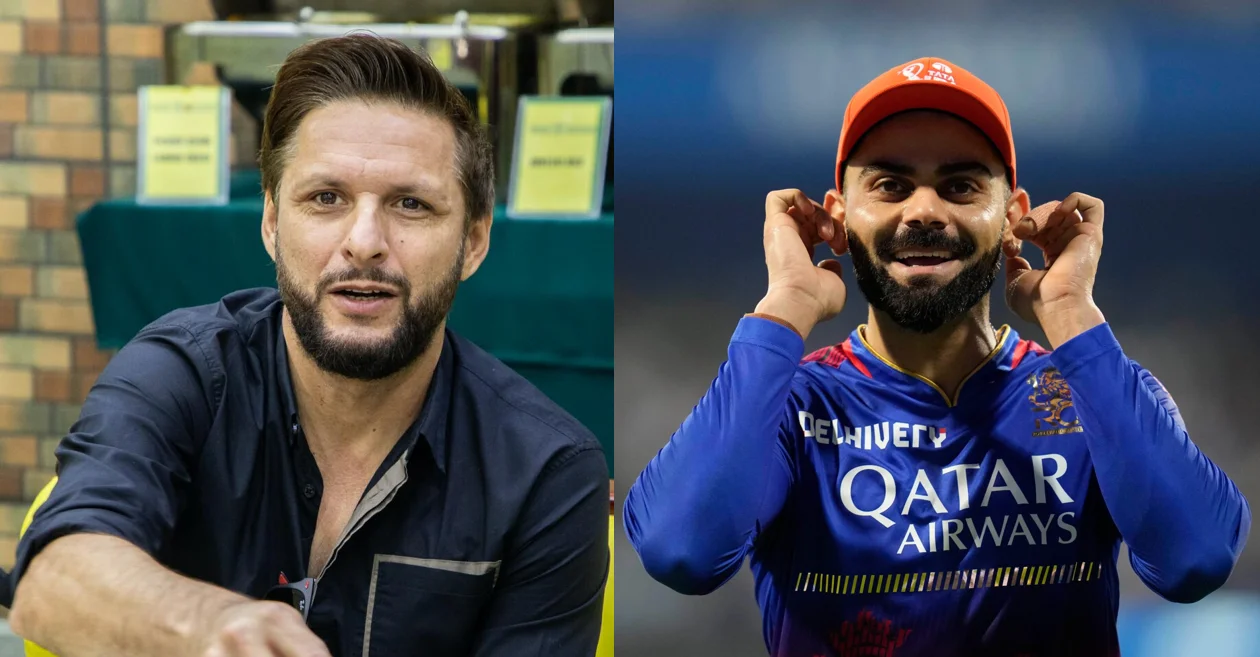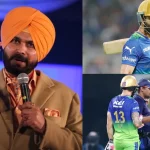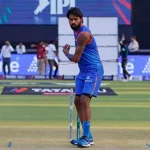Indian cricket star Virat Kohli’s recent expression of his desire to visit Pakistan has sparked a wave of positive sentiment across the border. A video of Kohli’s conversation with a Pakistani mountaineer went viral on social media, showcasing his warm reception in Pakistan. This development has not only captivated fans but also rekindled hopes for improved cricketing relations between the two nations.
Shahid Afridi Invites Virat Kohli to Pakistan
Former Pakistani cricketer Shahid Afridi echoed the enthusiasm surrounding Kohli’s statement, praising the Indian captain for his stance and its potential to foster better relations between the two cricket-mad nations. Afridi, a long-time advocate for the resumption of bilateral series between India and Pakistan, extended a personal invitation to Kohli to play in the Pakistan Super League (PSL) or to visit with the Indian national team.
“Virat Kohli’s statement showed that such cricketers are the ambassadors of their country. I had expected the same kind of statement from Virat Kohli. Thank you so much, Virat. We are waiting for you to come to Pakistan and play in PSL or with the Indian team. It would be good if you came with the Indian team,” Afridi said at a public event in Karachi.
Afridi’s invitation to Kohli is a significant gesture, underscoring the desire within Pakistan to rekindle the historic cricketing rivalry between the two nations. His words have resonated with cricket fans on both sides of the border, highlighting the role of sports in bridging political divides.
The Historical Context: India-Pakistan Cricket Rivalry
The cricketing rivalry between India and Pakistan is one of the most storied in the sport’s history. Matches between these two teams have always been high-stakes affairs, drawing massive viewership and intense fan engagement. However, strained political relations and security concerns have limited cricket matches between India and Pakistan for several years. The two teams currently only meet during major ICC tournaments.
Bilateral series between India and Pakistan have been rare since the early 2000s, with the last full series occurring in 2012-13. Since then, the geopolitical climate has made organizing such events increasingly challenging. Despite this, there has been a continuous push from cricketing figures and fans to see more frequent encounters.
The Impact of Kohli’s Statement
Virat Kohli’s statement about his desire to visit Pakistan has been met with widespread acclaim. His remarks have not only endeared him to Pakistani fans but also sparked conversations about the potential for improved cricketing ties. Social media has been abuzz with positive reactions, with many praising Kohli for his openness and sportsmanship.
Kohli’s words have also highlighted the role of athletes as ambassadors of goodwill. In a region often marked by political tension, sports provide a unique platform for fostering mutual respect and understanding. Kohli’s statement is seen as a step towards breaking down barriers and promoting a spirit of camaraderie.
Challenges to Resuming Bilateral Series
While the sentiment behind Kohli’s statement and Afridi’s invitation is overwhelmingly positive, there are significant challenges to resuming bilateral cricket series between India and Pakistan. Political tensions, security concerns, and diplomatic hurdles have historically impeded such efforts.
Security remains a paramount concern, with past incidents of violence and terrorism in the region casting long shadows over potential tours. Ensuring the safety of players and fans would require extensive planning and cooperation between both governments. Additionally, the broader geopolitical dynamics between India and Pakistan often spill over into sports, complicating efforts to organize bilateral series.
India vs Pakistan in T20 World Cup 2024
The upcoming ICC T20 World Cup 2024, scheduled to be held across the USA and the West Indies, will see India and Pakistan clash once again. Their highly anticipated group stage encounter in New York on June 9 promises to be a highlight of the tournament. With Kohli’s comments sparking hope for improved relations, this match could hold even greater significance.
The T20 World Cup matches between India and Pakistan are always blockbuster events, drawing millions of viewers worldwide. The 2024 edition will be no different, with fans eagerly awaiting the high-intensity contest. This match will not only be a battle for supremacy on the field but also a symbol of the enduring power of sports to unite people.
The Role of Cricket in Diplomacy
Cricket has long been seen as a potential bridge in Indo-Pak relations. Matches between the two nations often carry more than just sporting significance, symbolizing the complex relationship between the countries. Over the years, cricket diplomacy has seen moments of triumph and tragedy, reflecting the broader geopolitical landscape.
High-profile matches have sometimes led to thawing tensions, while at other times, they have exacerbated existing hostilities. Nevertheless, the consistent push from players, fans, and officials to keep the dialogue open through cricket underscores the sport’s unique role in diplomacy.
Hope for a Better Future
Virat Kohli’s desire to visit Pakistan and Shahid Afridi’s welcoming response have rekindled hopes for better cricketing ties between India and Pakistan. While significant challenges remain, the positive sentiment generated by this exchange highlights the potential of sports to foster goodwill and mutual respect.
As fans gear up for the ICC T20 World Cup 2024 and the much-anticipated India-Pakistan clash, the broader message of unity and sportsmanship resonates strongly. Cricket, with its immense popularity and emotional impact, continues to serve as a powerful tool for diplomacy and cultural exchange. Kohli’s gesture is a reminder that despite political differences, the love for the game can bring people together and pave the way for a more harmonious future.
Please check for information on the best betting sites in India and IPL betting sites – https://selectory.org/best-betting-sites/















